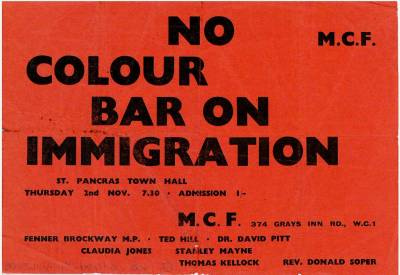Speaking out, identifying who has similar views and acting together are at the heart of campaigning for change.

Movement for Colonial Freedom flyer
Modern campaigners use email, Web sites and text messages to share information and encourage action as well as relying on older technology such as leaflets, posters and meetings.
Our collection captures the inside stories of attempts to challenge and change events in the last two hundred years.
We have information on:
Peterloo - the 1819 massacre of members of a peaceful crowd who had gathered in Manchester to demand political rights caused a national outcry.
Chartist movement - working people's drive for reform of Parliament in the 1830s and 1840s, at a time when they didn't even get a vote.
No Conscription Fellowship - pacifists believe that even during a war it is wrong to kill another human being. This organisation campaigned against the punishment and imprisonment of men who refused to fight in the First World War (1914-1918).
Fascist and anti-fascist material - the arguments for and against this political movement from its origins in Italy in the 1920s to the present day.
Pit and factory papers - in the 1920s and 30s Communist Party activists produced newspapers aimed at specific workers or workplaces. With titles such as The Salford Docker or The Crossley Motor, these papers reflect the conditions, concerns and politics of working people.
Unemployment - many stories of the hardship faced in the 1930a by those without jobs.
Liberation and its archives - the story of the campaign that started in 1954 to free British colonies from political and economic domination by Britain and the developed world.
Black and Asian struggles - organisations that have represented communities which have come to Britain since the Second World War
Grunwick - a major strike in the mid-1970s which was a key turning point in the industrial relations of the decade
Related Objects of the Month
August 2015: 1920 National League of the Blind march
 This photograph, donated to the Library by Tony Baldwinson, is the only surviving print from a now-lost negative. In order to put pressure on the government, the League took the then novel approach of a march from three locations to converge for a mass demonstration in Trafalgar Square. There had been many protest marches but this was the first to choreograph different contingents to raise awareness, with rallies in towns along their route as well as on their arrival in London. The Jarrow March 16 years later was based on their model.
This photograph, donated to the Library by Tony Baldwinson, is the only surviving print from a now-lost negative. In order to put pressure on the government, the League took the then novel approach of a march from three locations to converge for a mass demonstration in Trafalgar Square. There had been many protest marches but this was the first to choreograph different contingents to raise awareness, with rallies in towns along their route as well as on their arrival in London. The Jarrow March 16 years later was based on their model.
May 2015:1835 election expenses archive
 The Library is now the owner of a rare and most unusual archive of election material - from 1835. The material details the expenses of a Lincolnshire Tory candidate, Thomas George Corbett, including amounts spent on alcohol, tobacco and wagons to get his voters to the hustings.
The Library is now the owner of a rare and most unusual archive of election material - from 1835. The material details the expenses of a Lincolnshire Tory candidate, Thomas George Corbett, including amounts spent on alcohol, tobacco and wagons to get his voters to the hustings.
December 2012: 'Social security: the story of social progress and the Beveridge Plan', 1943 pamphlet
 Marking the publication of the Beveridge Report in December 1942 - As well as laying the foundations for the post-war establishment of the welfare state, the document provided a much needed morale boost during the dark days of war.
Marking the publication of the Beveridge Report in December 1942 - As well as laying the foundations for the post-war establishment of the welfare state, the document provided a much needed morale boost during the dark days of war.
November 2012: William Hone's 1819 pamphlet 'The political house that Jack built'
 Given that so much of the collection here at the WCML is given to charting the fight for recognition by parliament, the object of the month which we have chosen is a pamphlet from 1819 which satirises the lack of parliamentary democracy. The aim is to show that voting, now seen as a right, was not so long ago a distant dream for the majority of people.
Given that so much of the collection here at the WCML is given to charting the fight for recognition by parliament, the object of the month which we have chosen is a pamphlet from 1819 which satirises the lack of parliamentary democracy. The aim is to show that voting, now seen as a right, was not so long ago a distant dream for the majority of people.
June 2010: National Council for Civil Liberties
 The National Council for Civil Liberties (NCCL) was founded in 1934, by Ronald Kidd, to defend ‘the whole spirit of British freedom'; after he had witnessed brutal police attacks at the 1932 Hunger Marches.
The National Council for Civil Liberties (NCCL) was founded in 1934, by Ronald Kidd, to defend ‘the whole spirit of British freedom'; after he had witnessed brutal police attacks at the 1932 Hunger Marches.

